WMG News - Latest news from WMG
WMG helps bridge engineering skills gap with Design and Make Challenge
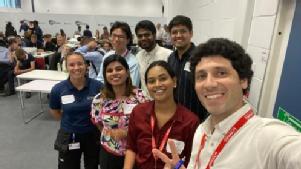 Members from WMG at the University of Warwick’s SME team worked together with the Manufacturing Assembly Network (MAN Group), on Tuesday (11th July), to offer a group of students the opportunity to learn real life engineering and design skills.
Members from WMG at the University of Warwick’s SME team worked together with the Manufacturing Assembly Network (MAN Group), on Tuesday (11th July), to offer a group of students the opportunity to learn real life engineering and design skills.
Eighty pupils from 16 local schools swapped their daily lessons to take part in the challenge. They were tasked,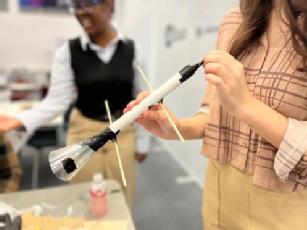 supported by engineers from the MAN Group's eight member companies, with building a miniature aircraft and then testing the designs.
supported by engineers from the MAN Group's eight member companies, with building a miniature aircraft and then testing the designs.
The event took place on the University of Warwick campus and was attended by WMG’s Executive Chair, Margot James, as well as representatives from the BBC and Sky News.
Dr Mark Swift, Director of SME Engagement at WMG, University of Warwick: "WMG is working tirelessly to address the skills gap, that our SME manufacturing partners continue to face, through education programmes; innovation projects; internships and knowledge transfer partnerships.
“It’s important that the manufacturing industry engages with future engineers, to encourage, inspire and lead us into a prosperous future together. This is exactly what the Design and Make Challenge aims to do.
“This event in particular, really brings home the creativity and innovation involved in the manufacturing sector, and it was a privilege to be part of it.”
You can watch footage of the event here: http://www.capturepr.co.uk/design_and_make_challenge_110723.html
£1.5m funding secured to advance the investigation of microstructures in battery materials
Researchers at WMG, University of Warwick’s Forensics & Advanced Characterisation of Batteries Group, have secured £1.5m funding for materials analysis in multiple format batteries.
The funding, from the University of Warwick’s Academic Equipment Fund and the High Value Manufacturing Catapult, will be used to purchase a Plasma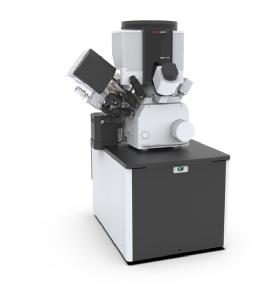 Focused Ion Beam (PFIB) microscope. The microscope is key to the accelerated development of new battery chemistries, providing unique access to the critical interfaces within battery cells that dictate best performance. This will be instrumental in developing new materials for better batteries, regardless of their end use application.
Focused Ion Beam (PFIB) microscope. The microscope is key to the accelerated development of new battery chemistries, providing unique access to the critical interfaces within battery cells that dictate best performance. This will be instrumental in developing new materials for better batteries, regardless of their end use application.
This PFIB will be the first specifically configured microscope dedicated to battery research in the world, allowing researchers at WMG to inform battery manufacturing, answer key scientific questions and link with industry and growing supply chains.
There is increased recognition in the battery community that the integration of new chemistries needed for the UK Government’s 2030 electric vehicle battery targets will require integrating new manufacturing processes with advanced microscopic characterisation. The PFIB has been specifically designed to address the critical challenges of studying alkali-based battery systems and will provide unique insights needed for the development of next generation batteries.
 The performance of battery materials is dictated by the stability, efficiency and functionality of the interfaces, i.e. the solid electrolyte interphase (SEI) at the anode and oxygen-induced cathode-electrolyte interface (CEI) at the cathode. Attempts to analyse these interfaces, in order to determine structure and chemistry, is seriously compromised using conventional techniques by the extreme air-sensitivity, beam sensitivity and the high volatility of certain species present. The specially configured PFIB microscope will address these issues.
The performance of battery materials is dictated by the stability, efficiency and functionality of the interfaces, i.e. the solid electrolyte interphase (SEI) at the anode and oxygen-induced cathode-electrolyte interface (CEI) at the cathode. Attempts to analyse these interfaces, in order to determine structure and chemistry, is seriously compromised using conventional techniques by the extreme air-sensitivity, beam sensitivity and the high volatility of certain species present. The specially configured PFIB microscope will address these issues.
WMG is one of seven HVM Catapult centres in the UK and is the lead centre for transport electrification. Investment in this PFIB is part of a range of equipment investments by the HVM Catapult and the University of Warwick to maintain WMG’s leading position in battery technology.
The PFIB has already secured interest from the Faraday Institution and from the Royal Academy of Engineering’s Lord Bhattacharyya Education Programme. Starting in the Autumn, a student will use this for a project entitled “The development of a new multi-modal capability for investigating the performance-controlling interfaces and microstructures that underpin operation of battery materials.”
The Lord Bhattacharyya Education Programme provides up to 90 bursaries annually for local students from lower socio-economic backgrounds. The objectives for the scheme include encouraging a greater number of young people from a more diverse range of backgrounds, raising their aspirations and skill levels. Moreover, it supports the growth of a science and engineering skills base for the UK.
The project will make extensive use of the new system to develop strategies for studying the degradation of buried interfaces and structure dynamics in state-of-the-art high Ni NMC cathodes as a function of cycle ageing i.e., the evolution of the cathode-electrolyte interphases. The platform provides some unique opportunities for developing powerful new ways to characterise these controlling interfaces and will form the basis for the project. Preliminary research will commence in October 2023. The project will be advertised online for interested applicants to apply – the studentships page, Jobs.ac.uk, FindAPhD.com and the Doctoral College website.
Find out more about WMG’s electrochemical research here: Electrochemical Materials (warwick.ac.uk)
The new PFIB microscope will be based in WMG’s Advanced Material Manufacturing Centre (AMMC).
Warwick University's Formula Student Team Unveils Cutting-Edge Race Car for 2023 Season
The University of Warwick student team at Warwick Racing (WR), has unveiled its 2023 racing cars that will compete in the Formula Student competition at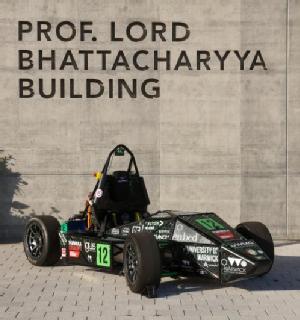 Silverstone just two weeks after the British Grand Prix.
Silverstone just two weeks after the British Grand Prix.
The cars will be judged on speed, acceleration and endurance at the Formula Student competition – the largest student motorsport competition in the world.
With a legacy of engineering excellence and a passion for motorsport innovation, Warwick Racing is a team made up of over 100 talented and dedicated students from diverse backgrounds and disciplines, who work collaboratively to design, build, and race high-performance vehicles that compete against university teams from around the world.
This year, the team have built their first electric autonomous race car, Wrai and the WRe2 – a battery electric race car. The cars were unveiled on 29th June 2023, at the National Automotive Innovation Centre.
The cars include use of cutting-edge technology, such as torque vectoring which enhances performance, while the autonomous car applies advanced software and artificial intelligence (ai) to an electric racing car to enable driverless racing.
The Formula Student competition, run by the Institute of Mechanical Engineering, serves as a launchpad for the next generation of engineers and allows participants to showcase their technical expertise, creativity, and teamwork. Warwick University's team, known for their commitment to excellence, has achieved some remarkable results in previous years including second place for business performance in 2022, and winning ‘most reliable EV’ in 2021. This year Warwick Racing are entering all three classes at the competition: Formula Student, AI, and Concept.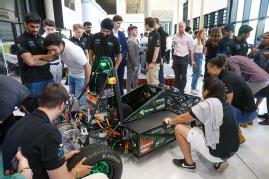 Team Principle and MEng Mechanical Engineering student, Prem Singh Gill said "We are incredibly proud to present the WRe2 and WRai to the world. Our team has poured their hearts and souls into this project, and we are confident that our cars will make a strong impact in the upcoming Formula Student competition at Silverstone. We invite everyone to join us in celebrating the culmination of our hard work and dedication. We are incredibly grateful to the University, WMG, High-Value Manufacturing Catapult, and our main sponsor Optimas."
Team Principle and MEng Mechanical Engineering student, Prem Singh Gill said "We are incredibly proud to present the WRe2 and WRai to the world. Our team has poured their hearts and souls into this project, and we are confident that our cars will make a strong impact in the upcoming Formula Student competition at Silverstone. We invite everyone to join us in celebrating the culmination of our hard work and dedication. We are incredibly grateful to the University, WMG, High-Value Manufacturing Catapult, and our main sponsor Optimas."
Student Projects Manager Dr James Meredith said: “The cars look fantastic, they represent a culmination of a huge effort from students and staff at WMG, University of Warwick and we are really proud to see them launched. We very much look forward to seeing them compete at Silverstone.”
Ends
Notes to editors
For media inquiries and interview requests, please contact:
Bron Mills, Bron.mills@warwick.ac.uk, +447824540720
About Warwick University Formula Student Team:
The Warwick University Formula Student team is an interdisciplinary group of students passionate about automotive engineering and motorsports. With a legacy of success and innovation, the team aims to design, build, and race high-performance vehicles that compete in the Formula Student competition. The team represents Warwick University on a global stage, showcasing their technical expertise and pushing the boundaries of automotive engineering.
WMG welcomes Indian Forum of Parliamentarians
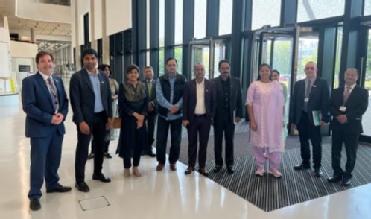 On Friday (16th June) Professor Robin Clark, Dean of WMG; and Professor David Greenwood, CEO of the High Value Manufacturing Catapult and Director of Industrial Engagement at WMG, were pleased to welcome guests from the Indian Forum of Parliamentarians.
On Friday (16th June) Professor Robin Clark, Dean of WMG; and Professor David Greenwood, CEO of the High Value Manufacturing Catapult and Director of Industrial Engagement at WMG, were pleased to welcome guests from the Indian Forum of Parliamentarians.
The delegation was made up of representatives from across various political parties including Shri Rajiv Pratap Rudy, Chair of the Forum of Parliamentarians; Ms. Vandana Chavan - National Congress Party; Shri Krishna Devarayalu Lavu - Yuvajana Sramika Rythu Congress Party; Shri Sujeet Kumar - Biju Janata Dal; Shri N K Premachandran - Revolutionary Socialist Party; and Shri Brijendra Singh - Bharatiya Janata Party.
The guests were particularly keen to hear more about WMG’s research and education programmes in electrification and mobility.
They were given a tour of the real-world demo site of the track system for the Coventry Very Light Rail flagship transport project, before Professor David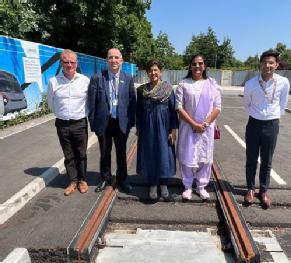 Greenwood led a tour of the Energy Innovation Centre (EIC) the home of WMG’s battery research.
Greenwood led a tour of the Energy Innovation Centre (EIC) the home of WMG’s battery research.
Finally the group heard more about the Warwick Moto project, where engineering students have been tasked with designing, building and racing an electric superbike.
The parliamentarians also had the opportunity to meet with Indian PhD students and researchers, studying and working at WMG.
Professor Robin Clark, Dean of WMG, explained: “ It was a pleasure to welcome the group of Indian Parliamentarians. Our relationship with India is long standing, and one that we value very highly.
“One example of our commitment is the strength of our relationship with IIT (Indian Institute of Technology) Kharagpur, whom in October 2022 we signed a Memorandum of Understanding (MoU) for a further five years, having first started in 2006.
We are increasingly appreciating the breadth of opportunity India presents, both in the academic and industrial spaces. As India is our main focus internationally at present, we expect to see more visits and more projects over the coming months and years!”
WMG welcomes Richard Parker
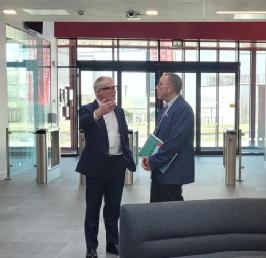 Professor Robin Clark, Dean of WMG welcomed Richard Parker, the Labour Party candidate for the Mayor of the West Midlands, to see WMG’s work on skills and innovation and to meet students, technicians and researchers who are working with West Midlands businesses to support industrial innovation and sustainability.
Professor Robin Clark, Dean of WMG welcomed Richard Parker, the Labour Party candidate for the Mayor of the West Midlands, to see WMG’s work on skills and innovation and to meet students, technicians and researchers who are working with West Midlands businesses to support industrial innovation and sustainability.
Following his selection for the West Midlands Mayoralty, Richard Parker is looking to develop his understanding of the West Midlands’ industrial innovation field to shape his manifesto.
Professor Robin Clark took him on a tour of WMG’s research and education facilities including the Degree Apprenticeship Centre where he had the opportunity to meet and chat to WMG apprentices and hear more about the WMG Skills Centre.
Following this, he went on to visit the real-world demo site of the track system for the Coventry Very Light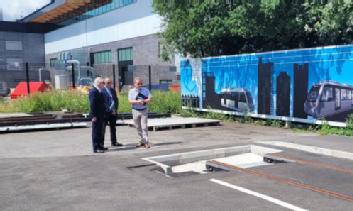 Rail flagship transport project, before receiving a tour of the Energy Innovation Centre (EIC) to hear more about WMG’s transport electrification projects with companies including Tata, Norton and Lotus.
Rail flagship transport project, before receiving a tour of the Energy Innovation Centre (EIC) to hear more about WMG’s transport electrification projects with companies including Tata, Norton and Lotus.
Professor Robin Clark, Dean of WMG, said: “It was a pleasure to welcome Richard Parker to WMG.
“We were pleased to have the opportunity to demonstrate our commitment to developing new engineering and manufacturing skills to help bridge the gap between academia and industry; and the chance to showcase our projects supporting productivity and sustainability in the region.”
WMG Workshop Manager selected for key technical advisory role
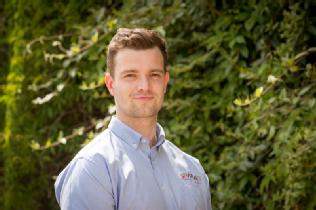 Congratulations to Zachary Parkinson, WMG at the University of Warwick’s, Workshop Manager, who has been appointed to the Technical Council at the Institute for Technical Skills and Strategy (ITSS).
Congratulations to Zachary Parkinson, WMG at the University of Warwick’s, Workshop Manager, who has been appointed to the Technical Council at the Institute for Technical Skills and Strategy (ITSS).
The ITSS was established in March 2023 and is funded by Research England. It is hosted by the University of Nottingham in partnership with a network of organisations and institutions across UK higher education and research, including the University of Warwick.
It was launched to ensure that the UK has the technical capability and capacity across academia, research, education, and innovation. Its aim is to support and enable the UK to be a global superpower in science, engineering, and the creative industries.
The ITSS received over 150 submissions to join its council with just 14 individuals, including Zac, selected as one of the very first founder members.
Zac and his fellow members will act as ITSS ambassadors meeting quarterly to advise on the needs of the technical community, contribute to progressing ITSS programmes/initiatives and to provide input on the assessment of internal submissions.
Members serve an initial two-year term, after which membership is refreshed to allow a wide range of ideas and individuals to be included.
Zac Parkinson, Workshop Manager at WMG, University of Warwick said: “I feel extremely privileged to have my application accepted to join the ITSS Council, and I am looking forward to working closely with other universities and external organisations to ensure we are providing the opportunities and skills required to help increase the number of skilled technicians across the country.”
Paul Johnson, Technical Services Manager at WMG, University of Warwick added: “It was great to hear that we have one of our own working with this new UK Institute that will make real change and influence the landscape for technicians working within universities. Zac is well placed, having been an apprentice, technician and now technical manager to help influence decisions and build on the good work already being conducted within the sector.’’
Find out more about WMG’s Technician Commitment here: Technician Commitment (warwick.ac.uk)
New taste and smell test could diagnose Alzheimer's long before memory loss starts
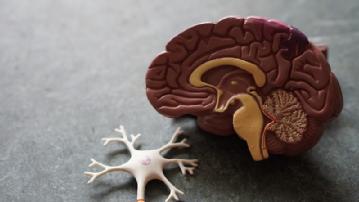
A simple smell and taste test could revolutionise diagnosis of Alzheimer’s – long before symptoms of memory loss even arise.
Scientists are working on a ground-breaking medical screening for the disease which could also improve treatment options. The research is based on growing evidence that people with Alzheimer’s can lose their sense of smell and taste many months or even years before other symptoms, such as memory loss, become apparent.
An early diagnosis is critical for those with the disease. New drug technology can slow, or even reverse the progress of Alzheimer’s, but only if the disease is detected early enough. The drug, lecanemab, is one of two new treatments for the disease.
The research, led by WMG at the University of Warwick together with Superlunary Labs and with support from University Hospitals Coventry & Warwickshire (UHCW) NHS Trust, New-Food innovation, and Alzheimer’s Society, could lead to UK-wide screening services where members of the public can take a simple smell and taste test. Those who perform poorly can then be referred for further tests which could result in an Alzheimer’s diagnosis.
The novel solution provides accurately simulated flavour samples (known as virtual flavour, developed in collaboration with New Food Innovation) via an easy-to-use low-cost dispenser, which could be used by a nurse as part of an annual health check, in pharmacies, care homes, community centres and even in the home.
While in the trial stages at the moment, academics hope that one day an inclusive mobile Alzheimer’s screening unit could reduce significant pressures on the NHS and ease waiting times for those who are struggling to get an appointment with their GPs.
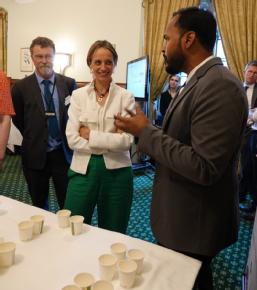 Professor Alan Chalmers from WMG at the University of Warwick said, “In this simple screening test, people will be given different flavours to smell and taste – they then determine which is sweeter, less astringent, smells more of lemon, for example. It’s an easy, non-invasive test which can be rolled out to people quickly across the UK.
Professor Alan Chalmers from WMG at the University of Warwick said, “In this simple screening test, people will be given different flavours to smell and taste – they then determine which is sweeter, less astringent, smells more of lemon, for example. It’s an easy, non-invasive test which can be rolled out to people quickly across the UK.
“At the moment, people who present with symptoms of memory loss are referred for MRI scans and spinal fluid tests to confirm a diagnosis. By the time memory loss occurs things are often too late; pioneering drug treatments only perform well in the early stages of degeneration. MRI scans and spinal fluid tests are currently not done before there is an indication of the disease as they are incredibly invasive, can cause distress and are expensive and time-consuming for the NHS. Failure of the flavour test can give the necessary early indication.
“Our preliminary data shows that there is a difference in the flavour detection of those with Alzheimer’s compared to those without the disease, so we hope to get further backing and implement these screening tests UK-wide.
“It’s important to note that the loss of smell and taste associated with Alzheimer’s is quite different to that of long COVID. While COVID could cause a loss of the sense of taste and smell, long COVID can alter your sense of flavour – a combination of taste, smell and mouthfeel – rather than diminish it.”
This research was showcased by the University of Warwick alongside the Alzheimer’s Society, at an All-Party Parliamentary Group (APPG) on dementia, on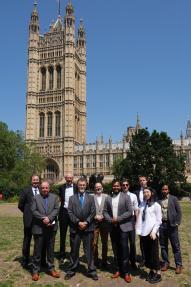 14 June. The APPG is hosted by Sir Jeremy Wright, MP for Kenilworth & Southam and vice-chair of the all-party parliamentary group on Dementia.
14 June. The APPG is hosted by Sir Jeremy Wright, MP for Kenilworth & Southam and vice-chair of the all-party parliamentary group on Dementia.
Sir Jeremy Wright MP added: “I am delighted to be hosting an event at the House of Commons focussing on a development that could contribute to a significant improvement in the mass diagnosis of Alzheimer’s, alongside the new strides in treatments that have been announced in recent months.”
Dr Richard Oakley, Associate Director of Research at Alzheimer’s Society, said: “It’s really exciting to see how researchers are thinking outside of the box about potential methods to detect the diseases that cause dementia at the earliest stages. This is so important now that new disease-modifying treatments are just around the corner.
“The NHS needs to be ready for these new treatments. We can’t be in a situation where new drugs are being approved but people can’t access them early when they work best. Alzheimer’s Society will continue to stand up for people living with dementia and push for more accurate, earlier dementia diagnosis in the NHS.”
Malcolm Barnes, Director of Superlunary Labs added, “Simplicity of the device and test is key to collecting big data across different age groups and demographics.”
£220m boost to Midlands economy through WMG support programme
WMG at the University of Warwick is celebrating the completion of a major funded programme this week which has helped to add £220m to the Midlands economy.
Over the last five years, WMG’s Digital Innovation for Manufacturing (DI4M) has helped create 660 jobs and digitise 370 businesses – supporting hundreds of small and medium sized manufacturers across the Midlands.
New products have been taken to market through the programme including a novel electric charging point that attaches to lampposts, ultra-high speed 3D printer, and a wall climbing robot to undertake important maintenance work on tall buildings.
DI4M has been a five year, £10m programme supporting SME manufacturers to implement digital innovation. Delivered across the six Local Enterprise Partnership (LEP) areas of Coventry and Warwickshire, Greater Birmingham and Solihull, the Black Country, South East Midlands, Leicester and Leicestershire and Worcestershire, it has been led by the SME Group within Warwick Manufacturing Group, part of the University of Warwick. The programme was funded by European Regional Development Fund (ERDF) and the WMG centre High Value Manufacturing Catapult.
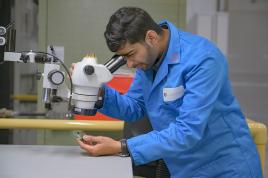 Companies that have benefited include Jaltek Systems who were helped to set up a new factory layout using digital twin technology and who also accessed a funded internship to get two major production lines up and running.
Companies that have benefited include Jaltek Systems who were helped to set up a new factory layout using digital twin technology and who also accessed a funded internship to get two major production lines up and running.
Gordon Ellis & Co was also a recipient of the funded programme and they were able to implement sensors and data collection devices around the factory to boost productivity and reduce waste.
Although this project has reached its endpoint, WMG’s SME group are continuing to support manufacturing SMEs through the High Value Manufacturing Catapult, Made Smarter West Midlands and through new schemes such as its Net Zero Innovation Programme and Business Energy Advice Toolkit which helps businesses reduce energy and costs with low-cost technology solutions.
Dr Mark Swift, Director of SME Engagement said: “The DI4M programme has been an important anchor for Midlands SME businesses through a period of unprecedented challenge and disruption. The programme has been a constant effective enabler for introducing new ideas, new technology to boost productivity as well as acting as a springboard to Net Zero and business energy efficiency. The economic impact speaks for itself – adding £220m, or £22 for every £1 invested, to our region is something we are all immensely proud of. We now look forward to further successes from a range of new energy efficiency, digital and productivity programmes.”
Find out more about WMG here https://warwick.ac.uk/fac/sci/wmg/
CILT accreditation for WMG Master’s Programme
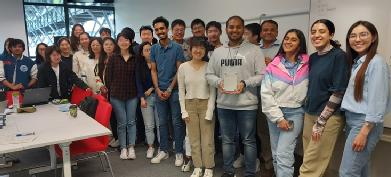 The Supply Chain Logistics Management (SCLM) MSc Programme at WMG, University of Warwick, has received accreditation from the Chartered Institute of Logistics and Transport (CILT).
The Supply Chain Logistics Management (SCLM) MSc Programme at WMG, University of Warwick, has received accreditation from the Chartered Institute of Logistics and Transport (CILT).
The programme originally received accreditation in 2012. This was renewed again in 2017, and after receiving very positive feedback, from all of the panel members, this has now been recommended for a further five years.
This will allow all students, upon graduation, to be automatically approved for CILT membership, a great benefit as they begin careers in supply chain.
Gary Bilsbarrow, Senior Teaching Fellow at WMG and MSc Supply Chain and Logistics Management lead for CILT accreditation, explained: “A strong relationship with the CILT as our industry’s leading professional body is key to continued recognition of our programme.
“This reaccreditation, along with strong positive feedback, recognises the potential benefits to employers of a SCLM MSc graduate and builds on the recently established academic partnership with CILT. This active partnership enhances employability and recognises the fusion of academic excellence with industrial relevance.
“Focused content is combined with the opportunity for industrial visits and industry guest speakers to provide an insight into current practice and the challenges of the future."
The MSc in Supply Chain and Logistics Management is a well-established course at WMG and has a current intake of 180 students.
Find out more about WMG’s Postgraduate Programmes here: WMG (University of Warwick) Full-time Master's (MSc) Programmes
New Director of Business Development appointed at WMG
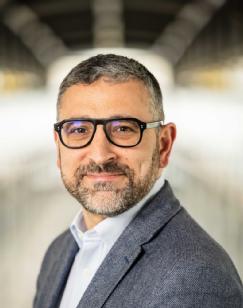 Dyrr Ardash has been appointed as the new Director of Business Development for WMG, at the University of Warwick.
Dyrr Ardash has been appointed as the new Director of Business Development for WMG, at the University of Warwick.
Dyrr will engage with education and research communities focusing on growing services to industry. He will lead business development across WMG, within professional education programmes and across all research areas - whether it be collaborative or industry funded opportunities. He will be engaging with a variety of customers from SMEs to large multi-nationals, within the UK and across the globe.
Dyrr is an automotive engineering graduate with more than 25 years’ experience in mobility and transportation, and a breadth of technical, commercial and strategic experience.
He started his career in powertrain development at Ford Motor Company, before joining DENSO where he developed electronic powertrain control and fuel systems for several European manufacturers. Dyrr held both Chief Engineer and senior commercial roles at Ricardo before joining WAE.
He has delivered projects globally in a variety of technical areas across products, from two-wheel mobility solutions, passenger cars, through to construction equipment and marine applications. At WAE he was responsible for strategic partnerships, collaborating closely with industry and academia, in addition to leading several de-carbonisation initiatives.
Dyrr explains: "I have long admired the impact that WMG has had on UK industry and its reach across the world. WMG capability is very relevant for the needs of today, but also the transformation of industry to one that will meet the sustainability requirements of mobility, transportation and beyond. I am very excited to be able to work with our current and potential partners to meet their sustainability goals and have a lasting impact on the world we live in.”
Professor David Greenwood, the CEO of the WMG centre High Value Manufacturing Catapult and Director for Industrial Engagement at WMG, University of Warwick, comments: “Dyrr joins WMG at an exciting time, as our primary research areas of electrification; sustainable materials; sustainable manufacturing; and sustainable transport are at the top of the agenda for government and much of industry.
“We look forward to broadening the impact of our research by working with an increasing number and type of businesses to deliver innovation into a wide range of market sectors.”
Find out more about the High Value Manufacturing Catapult centres here: https://hvm.catapult.org.uk/
To contact Dyrr about working with WMG, please email: wmgbusiness@warwick.ac.uk
You can also connect with Dyrr on LinkedIn
